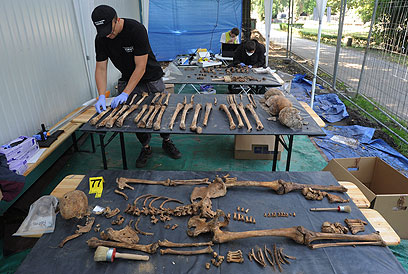 |
| Holocaust Memorial in Berlin |
Okay so obviously I am posting a lot today. . . But anyway, remember how I said earlier that thing about Nazis stealing your artifacts? Well now I've got a bigger ethical problem for you, and it's pretty reminiscent of Indiana Jones's famous quote (probably only famous to the avid Indiana Jones fans here but whatever) "Nazi's I hate Nazis." And all joking and movie referencing aside, the horrors that the Nazi's inflicted on fellow humans was atrocious and still influences our society today. Recently there has been a trend in the excavation of Nazi extermination and other camps. And if you find yourself nodding along with the need to understand the ins and outs (every little contextual detail) of what went on in these camps. . . then this is where we get to the ethical question. (Here's some very very detailed information on the topic: http://www.presentpasts.info/article/view/pp.12/2)
 |
| Excavation of Sobibor |
Last semester one of my fellow archaeology buddies and I discussed ethical issues of archaeology and ones that we felt were important to us personally. It ranged from someone who had encountered an issue of how to deal with a body while on excavation (and the field excavation leader didn't handle it well at ALL) to an issue of a stolen artifact that was on display in a local museum. While discussing we came to the topic of post WWII excavations of extermination camps. Not a topic one really thinks about when you think archaeology. Usually archaeology people think OLD and really WWII wasn't that long ago (my grandpa is still alive and he was in US air force). How can something so recent become an archaeological project? Well as a matter of fact archaeology can be very very recent. However, when it gets to be so recent more problems arise. The remains of people you are digging up probably have living relatives, and what about their things that you find when you are excavating? Do those get returned to the family, as a sort of 'I'm sorry' and here's something to remember them by? Or do they get put in a museum? Such questions aren't always as difficult as in this situation. . . because when it comes to the Nazi's very deliberate extermination of the Jewish people and political enemies. . . there is no way to truly comprehend or make up for the horrors that happened there.
 |
| Skeleton from Auschwitz |
Excavating mass graves will only provide a more exact body count. The Nazis were meticulous in their destruction and documentation. We DON'T need to know any more, we have so much already documented. . . and we have first-hand accounts. Why disregard the phrase "rest in peace" and dig up a history we already are well aware of. I'm not saying don't acknowledge the Holocaust, not at all! Because it is important to know and to be aware of that human history. . . but to dredge up the bones of people merely to get some sort of satisfaction out of excavating a extermination camp is completely unnecessary, and quite possibly immoral.
If it is knowledge you seek, we have it. . . if there is something else you seek in your excavations. . . perhaps think before you shovel.

No comments:
Post a Comment